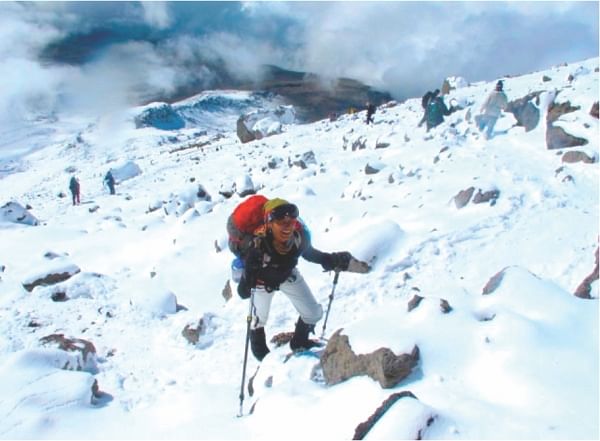| Home - Back Issues - The Team - Contact Us |
 |
| Volume 10 |Issue 40 | October 21, 2011 | |
|
|
Achievement
Struggling to the Summit Wasfia Nazreen, the first Bangladeshi woman to reach the highest peak of Tamanna Khan
For a moment the entire continent flashed before her eyes, as Zeus struck his mace across Africa's sky. Dazzled by the ominous beauty, she could have halted her journey momentarily, but it was not possible. She had to outrun Time and wade against the fury of the Snow Queen who showered her face with sharp painful slaps. Yet the young sprightly woman with a will, as strong as the very mountain she was climbing, trudged on. By 7:29 am local time on October 2, 2011, she became the first Bangladeshi woman to reach the highest peak of Africa – the Uhuru peak of Mt Kilimanjaro, 5895 metres above sea level. Wasfia Nazreen has adventure written in every aspect of her being. Thanks to her father's shipping job, she had the privilege of travelling almost around the world as early as the age of two. Spending a large part of her childhood in Chittagong added to her adventurous nature. She would often venture out to the hills to deal with the troubles of childhood and adolescence. “When I was dealing with all that internally, I used to go to the mountains and climbing was sort of a physical manifestation of that. It was a sort of a mental refuge for me,” she reminisces. However, Wasfia's formal introduction to mountains came much later in the highlands of Scotland where she went there for higher studies. As a matter of fact, by that time she had actually acquired quite a few mountaineering skills. While protesting against the Iraq war, during her undergraduate studies in the US, Wasfia would often hang banners from high rises, which required rappelling (a technique of controlled descent using a rope). “Basically, the techniques are similar when you are hanging a banner, so I learned the actual skills when I was protesting against all these establishments,” she states. Later, her profession as a rights activist made way for her passion, taking her to the mountains of Northern Indian, Nepal, Bhutan and Tibet. Here she also received formal training at a number of institutions specialising on mountaineering and wilderness. She however concludes from her experience that most of the mountaineering schools are very commercial. “I do not support, in any form, paying a company to rope me up the mountains, which unfortunately is what happens out there mostly. You can actually pay to get up to the Everest,” she says. She rather values and respects indigenous knowledge that has been passed down for generations. Fortunately, her work with indigenous people of the mountains earned her trust and friendship of the sherpas, the ethnic Nepalese highly regarded for their expertise in mountaineering. “I have many sherpa friends who have taken me to heights for days and then taught me their skills and passed on useful information about the mountains,” she says.
Coming back home from the mountains, she has set to steer her passion towards a good cause. “I have been thinking of doing something for Bangladesh for quite sometime. I have lived abroad and am tired of hearing the same thing about Bangladesh's politics, corruption, poverty and other negatives. While all those do exist we also come from a nation of very resilient people,” she says referring to the struggle for freedom in 1971 and struggle of Bangladeshis against all kinds of natural disasters and climatic catastrophes. Through 'Bangladesh On Seven Summits', Wasfia aspires to portray to the world the fighting spirit of our nation. “Since this year marks our (Bangladesh's) 40th anniversary, I thought it is the perfect year to launch the campaign,” she says. Under this campaign, she has vowed to reach the highest peak of seven mountains from the seven continents of the globe – Asia, Africa, Antarctica, Europe, Oceania, North America and South America. She is the first Bangladeshi woman who has attempted such an expedition, which symbolises the struggle of women who were at the forefront of the Liberation War, but whose contribution has not been duly recognised.
The campaign launched on July, 2011 is being supported by the Liberation War Museum. “Logistically speaking it is a huge initiative, money wise and everything,” she says. Wasfia left her regular job at Care Bangladesh towards the end of last November to run this campaign that would take her around the world in two years. “I still have not taken big funding from any corporate body. I have sold off whatever materialistic stuff I had,” she recounts how she collected the initial fund by selling her inherited land and jewellery. “A year down the line we have a foundation that we have formed called 'Bangladesh On Seven Summits',” informs Wasfia adding that the foundation formed last month initially aims to channel funds properly from big sponsors to support the campaign. “Once the climb of the seven summits is done, the foundation is going to work exclusively for training and educating women after HSC or SSC level. In foreign countries there is a wilderness study programme in college and university or if you want to do mountaineering studies, you can do that in college but here obviously it is like a luxury,” she says.
At present, she is preparing for her trip to the Canadian Rockies where she will receive training from Pat Morrow, the first man to complete the seven summits. “They invited me to board with them and receive training. That is the trainer, who said that I actually had to go and live in temperatures like that of Canada and Alaska for a few months. So I will be climbing some other mountains with him, not the seven summits. Then I will go from there to Aconcagua (South America in December 2011),” she explains drawing on the need for conditioning herself to suit the cold climates of the mountains especially that of Antarctica. Being a woman of the plains, Wasfia's aspiration to climb to the summits of the world has not been easy. However, her free-spirit, confidence and willingness to follow her heart has launched her on this unique journey. “You have to break free,” she believes, “irrespective of whether you are a man or women, if you are trying to reach your full potential, no one is going to make ways for you as good as you can make it for yourself.”
Copyright (R) thedailystar.net 2011 |
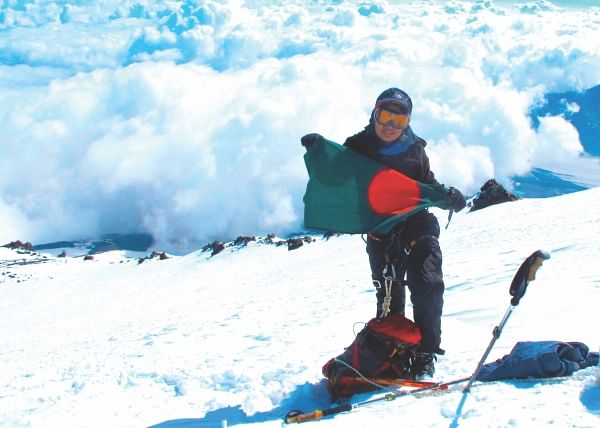
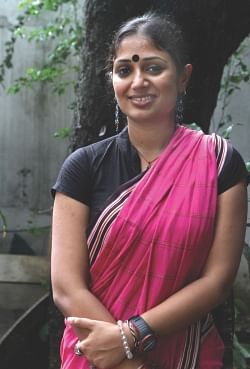
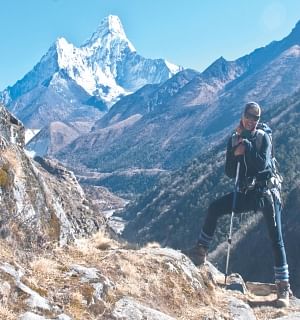
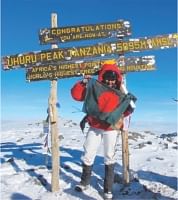
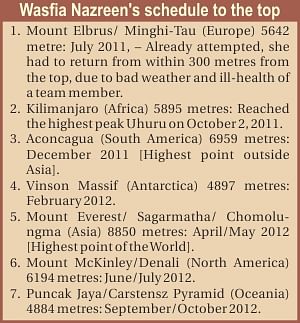 Bangladesh on Seven Summits Foundation will provide training only to women because the existing mountaineering or trekking groups in the country do not focus on them, opines Wasfia. “Women's struggle up in the mountain is very different,” she notes. Referring to the physical limitations experienced by women, she provides the statistics: only 37 women out of a total of about 450 mountaineers worldwide have completed the seven summits since the eighties. Among the 37 women only two are Asian, she adds. “We are thinking, in the long term, this will be a small hub for South Asia because even in India and Nepal there is no such institution that focuses on women so far. So we are hoping, if all goes well, to commence the course from the fall of 2012,”hopes Wasfia.
Bangladesh on Seven Summits Foundation will provide training only to women because the existing mountaineering or trekking groups in the country do not focus on them, opines Wasfia. “Women's struggle up in the mountain is very different,” she notes. Referring to the physical limitations experienced by women, she provides the statistics: only 37 women out of a total of about 450 mountaineers worldwide have completed the seven summits since the eighties. Among the 37 women only two are Asian, she adds. “We are thinking, in the long term, this will be a small hub for South Asia because even in India and Nepal there is no such institution that focuses on women so far. So we are hoping, if all goes well, to commence the course from the fall of 2012,”hopes Wasfia.